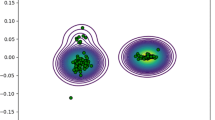Abstract
Given a large network, changing over time, how can we find patterns and anomalies? We propose Com2, a novel and fast, incremental tensor analysis approach, which can discover both transient and periodic/ repeating communities. The method is (a) scalable, being linear on the input size (b) general, (c) needs no user-defined parameters and (d) effective, returning results that agree with intuition.
We apply our method on real datasets, including a phone-call network and a computer-traffic network. The phone call network consists of 4 million mobile users, with 51 million edges (phonecalls), over 14 days. Com2 spots intuitive patterns, that is, temporal communities (comet communities).
We report our findings, which include large ‘star’-like patterns, nearbipartite- cores, as well as tiny groups (5 users), calling each other hundreds of times within a few days.
Access this chapter
Tax calculation will be finalised at checkout
Purchases are for personal use only
Preview
Unable to display preview. Download preview PDF.
Similar content being viewed by others
References
Kolda, T., Bader, B.: Tensor decompositions and applications. SIAM Review 51(3) (2009)
Harshman, R.: Foundations of the PARAFAC procedure: Models and conditions for an “explanatory” multimodal factor analysis (1970)
Maruhashi, K., Guo, F., Faloutsos, C.: Multiaspectforensics: Pattern mining on large-scale heterogeneous networks with tensor analysis. In: Proceedings of the Third International Conference on Advances in Social Network Analysis and Mining (2011)
Papalexakis, E.E., Faloutsos, C., Sidiropoulos, N.D.: Parcube: Sparse parallelizable tensor decompositions. In: Flach, P.A., De Bie, T., Cristianini, N. (eds.) ECML PKDD 2012, Part I. LNCS, vol. 7523, pp. 521–536. Springer, Heidelberg (2012)
Kolda, T.G., Bader, B.W., Kenny, J.P.: Higher-order web link analysis using multilinear algebra. In: ICDM, pp. 242–249. IEEE Computer Society (2005)
Fortunato, S.: Community detection in graphs. Physics Reports 486(35), 75–174 (2010)
Kumar, R., Novak, J., Raghavan, P., Tomkins, A.: On the bursty evolution of blogspace. In: WWW (2003)
Leskovec, J., Kleinberg, J., Faloutsos, C.: Graph evolution: Densification and shrinking diameters. IEEE TKDD (2007)
Gionis, A., Mannila, H., Seppänen, J.K.: Geometric and combinatorial tiles in 0–1 data. In: Boulicaut, J.-F., Esposito, F., Giannotti, F., Pedreschi, D. (eds.) PKDD 2004. LNCS (LNAI), vol. 3202, pp. 173–184. Springer, Heidelberg (2004)
Sun, J., Papadimitriou, S., Faloutsos, C., Yu, P.S.: Graphscope: Parameter-free mining of large time-evolving graphs. In: KDD (2007)
Liu, Z., Yu, J., Ke, Y., Lin, X., Chen, L.: Spotting significant changing subgraphs in evolving graphs. In: ICDM (2008)
Sun, J., Tao, D., Faloutsos, C.: Beyond streams and graphs: Dynamic tensor analysis. In: KDD (2006)
Tantipathananandh, C., Berger-Wolf, T.Y.: Finding communities in dynamic social networks. In: ICDM (2011)
Prakash, B.A., Sridharan, A., Seshadri, M., Machiraju, S., Faloutsos, C.: Eigenspokes: Surprising patterns and scalable community chip** in large graphs. In: Zaki, M.J., Yu, J.X., Ravindran, B., Pudi, V. (eds.) PAKDD 2010. LNCS, vol. 6119, pp. 435–448. Springer, Heidelberg (2010)
Karypis, G., Kumar, V.: Metis: unstructured graph partitioning and sparse matrix ordering system. Technical report (1995)
Grünwald, P.D.: The minimum description length principle. The MIT Press (2007)
Rissanen, J.: A universal prior for integers and estimation by minimum description length. The Annals of Statistics, 416–431 (1983)
Miettinen, P.: Boolean tensor factorizations. In: ICDM (2011)
Takane, Y., Young, F.W., De Leeuw, J.: Nonmetric individual differences multidimensional scaling: an alternating least squares method with optimal scaling features. Psychometrika 42(1), 7–67 (1977)
Author information
Authors and Affiliations
Editor information
Editors and Affiliations
Rights and permissions
Copyright information
© 2014 Springer International Publishing Switzerland
About this paper
Cite this paper
Araujo, M. et al. (2014). Com2: Fast Automatic Discovery of Temporal (‘Comet’) Communities. In: Tseng, V.S., Ho, T.B., Zhou, ZH., Chen, A.L.P., Kao, HY. (eds) Advances in Knowledge Discovery and Data Mining. PAKDD 2014. Lecture Notes in Computer Science(), vol 8444. Springer, Cham. https://doi.org/10.1007/978-3-319-06605-9_23
Download citation
DOI: https://doi.org/10.1007/978-3-319-06605-9_23
Publisher Name: Springer, Cham
Print ISBN: 978-3-319-06604-2
Online ISBN: 978-3-319-06605-9
eBook Packages: Computer ScienceComputer Science (R0)




